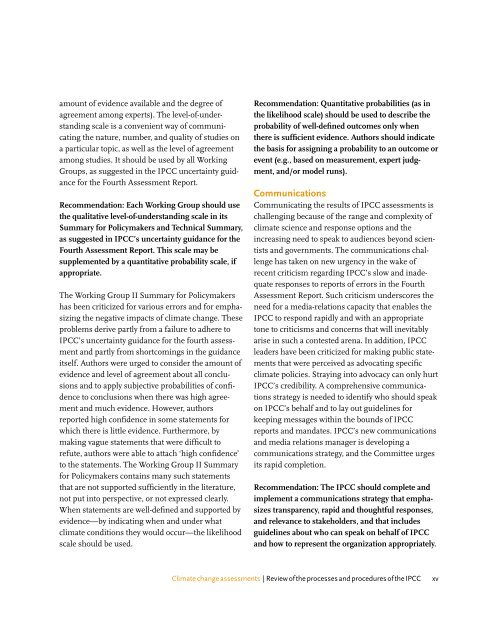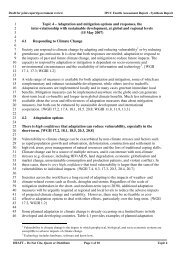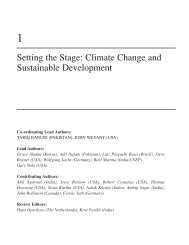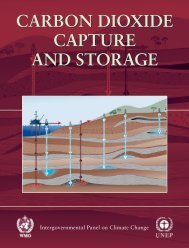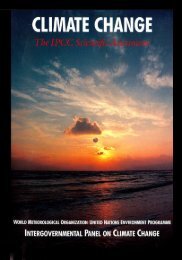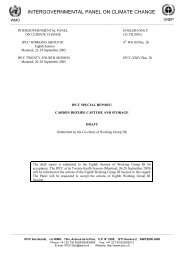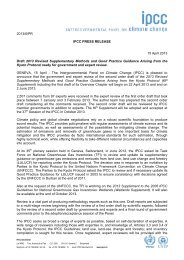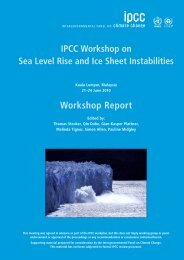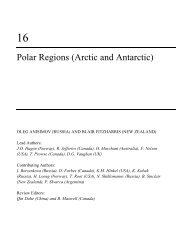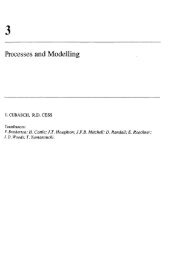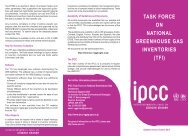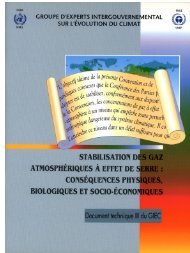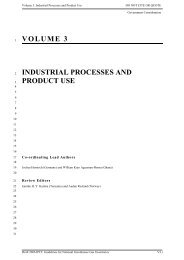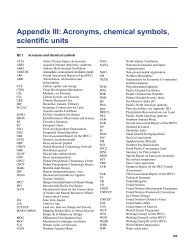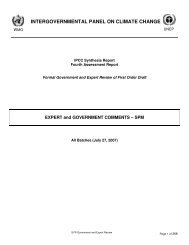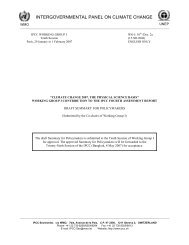Climate change assessments Review of the processes and ...
Climate change assessments Review of the processes and ...
Climate change assessments Review of the processes and ...
You also want an ePaper? Increase the reach of your titles
YUMPU automatically turns print PDFs into web optimized ePapers that Google loves.
amount <strong>of</strong> evidence available <strong>and</strong> <strong>the</strong> degree <strong>of</strong><br />
agreement among experts). The level-<strong>of</strong>-underst<strong>and</strong>ing<br />
scale is a convenient way <strong>of</strong> communicating<br />
<strong>the</strong> nature, number, <strong>and</strong> quality <strong>of</strong> studies on<br />
a particular topic, as well as <strong>the</strong> level <strong>of</strong> agreement<br />
among studies. It should be used by all Working<br />
Groups, as suggested in <strong>the</strong> IPCC uncertainty guidance<br />
for <strong>the</strong> Fourth Assessment Report.<br />
Recommendation: Each Working Group should use<br />
<strong>the</strong> qualitative level-<strong>of</strong>-underst<strong>and</strong>ing scale in its<br />
Summary for Policymakers <strong>and</strong> Technical Summary,<br />
as suggested in IPCC’s uncertainty guidance for <strong>the</strong><br />
Fourth Assessment Report. This scale may be<br />
supplemented by a quantitative probability scale, if<br />
appropriate.<br />
The Working Group II Summary for Policymakers<br />
has been criticized for various errors <strong>and</strong> for emphasizing<br />
<strong>the</strong> negative impacts <strong>of</strong> climate <strong>change</strong>. These<br />
problems derive partly from a failure to adhere to<br />
IPCC’s uncertainty guidance for <strong>the</strong> fourth assessment<br />
<strong>and</strong> partly from shortcomings in <strong>the</strong> guidance<br />
itself. Authors were urged to consider <strong>the</strong> amount <strong>of</strong><br />
evidence <strong>and</strong> level <strong>of</strong> agreement about all conclusions<br />
<strong>and</strong> to apply subjective probabilities <strong>of</strong> confidence<br />
to conclusions when <strong>the</strong>re was high agreement<br />
<strong>and</strong> much evidence. However, authors<br />
reported high confidence in some statements for<br />
which <strong>the</strong>re is little evidence. Fur<strong>the</strong>rmore, by<br />
making vague statements that were difficult to<br />
refute, authors were able to attach ‘high confidence’<br />
to <strong>the</strong> statements. The Working Group II Summary<br />
for Policymakers contains many such statements<br />
that are not supported sufficiently in <strong>the</strong> literature,<br />
not put into perspective, or not expressed clearly.<br />
When statements are well-defined <strong>and</strong> supported by<br />
evidence—by indicating when <strong>and</strong> under what<br />
climate conditions <strong>the</strong>y would occur—<strong>the</strong> likelihood<br />
scale should be used.<br />
Recommendation: Quantitative probabilities (as in<br />
<strong>the</strong> likelihood scale) should be used to describe <strong>the</strong><br />
probability <strong>of</strong> well-defined outcomes only when<br />
<strong>the</strong>re is sufficient evidence. Authors should indicate<br />
<strong>the</strong> basis for assigning a probability to an outcome or<br />
event (e.g., based on measurement, expert judgment,<br />
<strong>and</strong>/or model runs).<br />
Communications<br />
Communicating <strong>the</strong> results <strong>of</strong> IPCC <strong>assessments</strong> is<br />
challenging because <strong>of</strong> <strong>the</strong> range <strong>and</strong> complexity <strong>of</strong><br />
climate science <strong>and</strong> response options <strong>and</strong> <strong>the</strong><br />
increasing need to speak to audiences beyond scientists<br />
<strong>and</strong> governments. The communications challenge<br />
has taken on new urgency in <strong>the</strong> wake <strong>of</strong><br />
recent criticism regarding IPCC’s slow <strong>and</strong> inadequate<br />
responses to reports <strong>of</strong> errors in <strong>the</strong> Fourth<br />
Assessment Report. Such criticism underscores <strong>the</strong><br />
need for a media-relations capacity that enables <strong>the</strong><br />
IPCC to respond rapidly <strong>and</strong> with an appropriate<br />
tone to criticisms <strong>and</strong> concerns that will inevitably<br />
arise in such a contested arena. In addition, IPCC<br />
leaders have been criticized for making public statements<br />
that were perceived as advocating specific<br />
climate policies. Straying into advocacy can only hurt<br />
IPCC’s credibility. A comprehensive communications<br />
strategy is needed to identify who should speak<br />
on IPCC’s behalf <strong>and</strong> to lay out guidelines for<br />
keeping messages within <strong>the</strong> bounds <strong>of</strong> IPCC<br />
reports <strong>and</strong> m<strong>and</strong>ates. IPCC’s new communications<br />
<strong>and</strong> media relations manager is developing a<br />
communications strategy, <strong>and</strong> <strong>the</strong> Committee urges<br />
its rapid completion.<br />
Recommendation: The IPCC should complete <strong>and</strong><br />
implement a communications strategy that emphasizes<br />
transparency, rapid <strong>and</strong> thoughtful responses,<br />
<strong>and</strong> relevance to stakeholders, <strong>and</strong> that includes<br />
guidelines about who can speak on behalf <strong>of</strong> IPCC<br />
<strong>and</strong> how to represent <strong>the</strong> organization appropriately.<br />
<strong>Climate</strong> <strong>change</strong> <strong>assessments</strong> | <strong>Review</strong> <strong>of</strong> <strong>the</strong> <strong>processes</strong> <strong>and</strong> procedures <strong>of</strong> <strong>the</strong> IPCC<br />
xv


